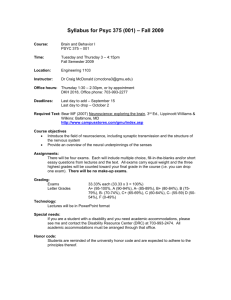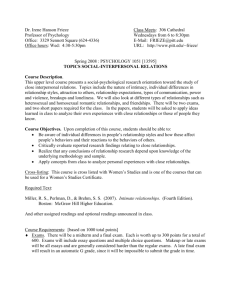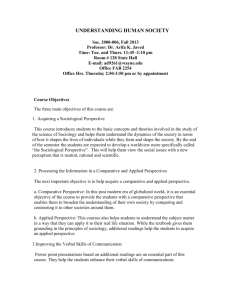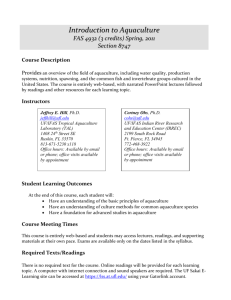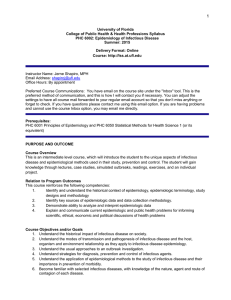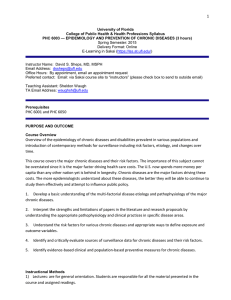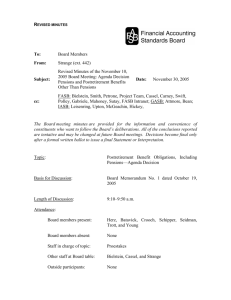1 Intermediate Accounting ACG 4133C – Fall 2010 Instructor
advertisement
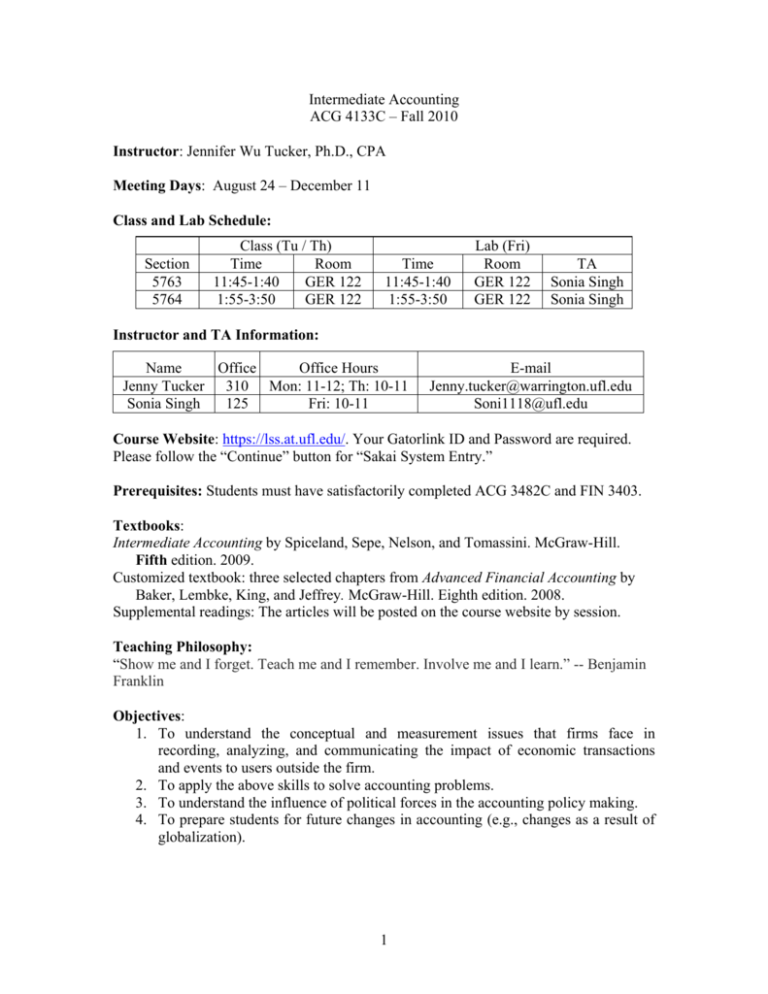
Intermediate Accounting ACG 4133C – Fall 2010 Instructor: Jennifer Wu Tucker, Ph.D., CPA Meeting Days: August 24 – December 11 Class and Lab Schedule: Section 5763 5764 Class (Tu / Th) Time Room 11:45-1:40 GER 122 1:55-3:50 GER 122 Time 11:45-1:40 1:55-3:50 Lab (Fri) Room GER 122 GER 122 TA Sonia Singh Sonia Singh Instructor and TA Information: Name Office Office Hours Jenny Tucker 310 Mon: 11-12; Th: 10-11 Sonia Singh 125 Fri: 10-11 E-mail Jenny.tucker@warrington.ufl.edu Soni1118@ufl.edu Course Website: https://lss.at.ufl.edu/. Your Gatorlink ID and Password are required. Please follow the “Continue” button for “Sakai System Entry.” Prerequisites: Students must have satisfactorily completed ACG 3482C and FIN 3403. Textbooks: Intermediate Accounting by Spiceland, Sepe, Nelson, and Tomassini. McGraw-Hill. Fifth edition. 2009. Customized textbook: three selected chapters from Advanced Financial Accounting by Baker, Lembke, King, and Jeffrey. McGraw-Hill. Eighth edition. 2008. Supplemental readings: The articles will be posted on the course website by session. Teaching Philosophy: “Show me and I forget. Teach me and I remember. Involve me and I learn.” -- Benjamin Franklin Objectives: 1. To understand the conceptual and measurement issues that firms face in recording, analyzing, and communicating the impact of economic transactions and events to users outside the firm. 2. To apply the above skills to solve accounting problems. 3. To understand the influence of political forces in the accounting policy making. 4. To prepare students for future changes in accounting (e.g., changes as a result of globalization). 1 Structure: Roughly speaking, we cover one topic (one chapter) each week. For each topic, we discuss (1) the conceptual issues, (2) accounting measurement and treatment under the U.S. GAAP, (3) similarity to and differences from the IFRS, and (4) real-world issues. Each class is a combination of lecture, class exercises, and discussion. Friday labs are problem-solving, group work, and cases. Course Requirements: Class Participation: You are encouraged to volunteer, ask questions, and bring accounting-related issues for class discussion. I may cold-call you even if you do not volunteer. Participation is evaluated on quality rather than quantity. Readings: You are required to finish the assigned readings before class and be prepared for class exercises and discussion. Supplementary readings will be posted a week before class and tested in the exam that follows the assignment. In addition to the assigned readings, you should read the business press. Homework: After each session I recommend but do not collect homework problems. The recommended homework problems are a minimum. The solutions to all problems in each chapter will be posted on the course website in the week of the topic. Lab: Your TA will evaluate your lab performance at the end of the course. She will state the policy at the beginning of the course about how lab grades will be assigned. There will be a quiz at the beginning of almost each lab. Exams: Three exams are scheduled for the course: Exam 1: October 1 (Friday, lab time) Exam 2: October 29 (Friday, lab time) Final Exam: December 11 (Saturday, cumulative, 11am-2pm, Gerson 126) Grading: Class participation Lab participation Exam 1 Exam 2 Final Exam Total 10 5 25 25 35 100 Other: 1. Grading issues must be raised to your TA within a week after the graded exam is returned. Such requests would give your TA the right to re-grade the whole exam. There is no guarantee that the new score will be higher. 2. No make-up exams will be given. If Exam 1 or Exam 2 has to be missed, the remaining exams will be reweighted. Class absences and missing Exam 1 or 2 may be excused in case of your sickness or an emergency related to you or your immediate family members only if you send me an e-mail in advance (or leave me a phone 2 message when you do not have access to e-mails) and submit the documentation supporting your excuse within a week after your return. Weddings, weather, and transportation problems are not valid excuses. 3. Success in this course is unlikely if homework and readings are not done regularly as scheduled. 4. Please come to class on time and turn off your electronic devices (including computers) before class. 5. The exams are closed-book and closed notes. Only basic calculators (+, -, *, /, %, and ) are allowed at exams. Course Outline Week Session Date 1 8/24 1 2 8/26 2 3 4 8/31 9/2 3 5 6 9/7 9/9 4 7 8 9/14 9/16 9 10 9/21 9/23 7 11 12 Fri. 13 14 9/28 9/30 10/1 10/5 10/7 8 15 16 10/12 10/14 9 17 18 10/19 10/21 19 20 Fri 21 10/26 10/28 10/29 11/2 5 6 10 Topic Introduction Overview of accounting measurement issues Lab (introduction, ground rules) PPE and intangible assets Subsequent measurement of PPE and intang. Lab Investments I Investments II (derivatives) Lab Investments II (derivatives) Liabilities, contingencies, and note payable Lab Bonds Leases I Lab Leases II Leases III Exam 1 (lab time) Accounting for income taxes I Accounting for income taxes II Lab Accounting for income taxes III Pension and other postretirement benefits I No lab Pension and other postretirement benefits II Shareholders’ equity Lab Stock options and earnings per share I Stock options and earnings per share II Exam 2 (lab time) Accounting changes and error corrections I 3 Reading Ch.10 Ch.11 Ch.12 Appendix A (p.1185- ) Appendix A(p.1185- ) Ch.13, 14 Ch.14 Ch.15 Ch.15 Ch.15 Ch.16 Ch.16 Ch.17 (until p.907) Ch.17 (from p.907) Ch.18 Ch.19 (until p.1011) Ch.19 (from p.1012) Ch.20 11 22 11/4 23 11/9 11/11 24 25 11/16 11/18 26 11/24 11/25 27 28 11/30 12/2 29 12/7 12/9 12/11 12 13 14 15 16 Sat. Accounting changes and error corrections II Lab Accounting restatements Veterans’ Day – no class No lab Cash flow statement I (Direct method) Cash flow statement II (Indirect method) Lab Segment and quarterly reporting Thanksgiving Holiday – no class No lab Partnerships I Partnerships II Lab No class Reading day – no class Final Exam (11 am – 2 pm, Gerson 126) 4 Ch.20 Ch.21 Ch.21 Baker Ch.13 Baker Ch.15 Baker Ch.16 Cumulative


